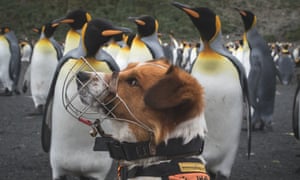
One of the dogs used to hunt for any remaining rodents.
Photograph: Oliver Prince/South Georgia Heritage Trust
The world’s biggest project to eradicate a dangerous invasive species has been declared a success, as the remote island of South Georgia is now clear of the rats and mice that had devastated its wildlife for nearly 250 years.
Rats and mice were inadvertently introduced to the island, off the southern tip of South America and close to Antarctica, by ships that stopped there, usually on whaling expeditions. The effect on native bird populations was dramatic. Unused to predators, they laid their eggs on the ground or in burrows, easily accessible to the rodents.
Two species of birds unique to the island, the South Georgia pipit and pintail, were largely confined to a few tiny islands off the coast, which the rodents could not reach, and penguins and other seabird populations were also threatened.
Continue reading
No comments:
Post a Comment